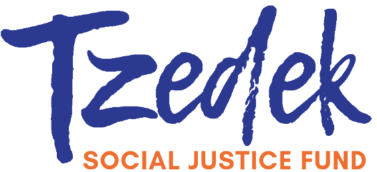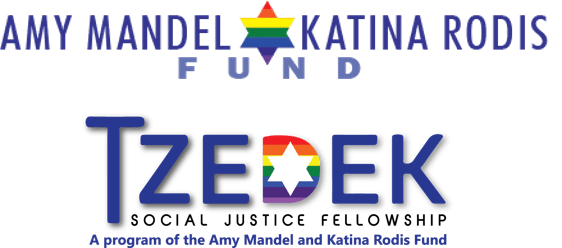In these tenuous days marked by injustice, the Amy Mandel and Katina Rodis Fund (AMKRF) and the Tzedek Social Justice Fellowship often receive inquiries about our work, our vision, and our relationship to big questions of our time. We center integrity, critical inquiry, compassion, collaboration, equity, and inclusion in the work we do, and together we strive towards transparency and accountability.
Here’s some information about how we understand ourselves as a Jewish organization, our relationship to Israel and Palestine, and our position on the Boycott, Divest, and Sanctions (BDS) movement.
What does it mean to be a secular Jewish organization?
The Tzedek Social Justice Fellowship was founded on the progressive Jewish values of justice (Tzedek), equitable giving (Tzedakah), repairing the world (Tikkun Olam), and leadership (Hanhagah). We draw on the spiritual and cultural legacy of Jewish communities, alongside a history of Jewish social justice activism to inform our work. While we are Jewish identified, we are not a religious organization. And, our work is inclusive. We value intersectionality, ally-ship, and bridge building. Our Fellowship is open to all emerging social justice leaders.
Who do we fund?
The funding priorities of the Amy Mandel and Katina Rodis Foundation focus on LGBTQ advocacy and building capacity in the Southern United States for LGBTQ work. Increasingly, we fund people of color led organizations as we seek to end enduring inequities in grant making. We also fund progressive Jewish organizations invested in fighting anti-Semitism, specifically supporting their LGBTQ programming.
A few of the Amy Mandel and Katina Rodis Fund’s national and international grantees are…Bend The Arc, The National Black Justice Coalition, Southerners on New Ground, The Southern Poverty Law Center, Keshet, Astrea Lesbian Foundation for Justice, The LGBT Racial Justice Fund, Jerusalem Open House for Pride and Tolerance, the Southern Jewish Resource Network for Gender and Sexual Diversity (SOJOURN), and the National Council of Jewish Women.
We unapologetically fund organizations with an explicitly Jewish and socially progressive mission. This is a key strategy in our work to challenge the violence of anti-Semitism. Through our work with Jewish organizations, we know that the policies of the state of Israel and Israeli citizens are not one and the same. Just as many Americans do not support the impending policies of a Trump White House, we reject the idea that supporting organizations that work in Israel is the same as endorsing the policies of the Israeli government. Through our program, we invest in strengthening Jewish communities’ intersectional lens.
The Asheville-based nonprofit organizations supported by our local program, the Tzedek Social Justice Fellowship, work in three primary areas: LGBTQ equality, racial equity, and combating anti-Semitism.
Why are we focused on combating anti-Semitism?
Waves of blatant anti-Semitism tinge history, and currently, episodes of anti-Semitism erupt daily throughout the U.S. and Europe. In a landscape of oppressions, anti-Semitism is sometimes quiet, but it is easily aroused whenever a scapegoat is needed. The realities of anti-Semitism are often erased from social justice spaces that claim to be intersectional. Our belief is that this is a profound exclusion that compromises our movements’ capacities to respond to injustice, broadly defined. Moreover, this exclusion operates on the assumption of Jewish whiteness, which erases both the reality of Jews of color and the history of racialized anti-Semitism towards all Jews. We know that combating anti-Semitism alongside anti-black racism, Islamophobia, and xenophobia is essential toward building robust coalitions. In relation to the ongoing conflict and violence in Israel and Palestine, our vision is of a world in which all humans flourish–Jews and Palestinians.
Does Tzedek support Israeli occupation of Palestine?
No.
Does AMKRF or Tzedek affiliate with the BDS movement?
No.
We believe in open dialogue and critique of nation states, social movements, tactics, and strategies. We do not believe that critique of Israel is inherently anti-Semitic. Rather, we know that deep assessment of militarism is essential as we seek a world that values our collective safety and well-being. We look at the world from multiple perspectives, resisting simple narratives and either/or thinking, knowing that multiple truths exist alongside one another, and that critical conversations are essential in finding a way forward. We believe that both Israel and Palestine have the right to exist. We also witness how intellectual, artistic, and political boycotts deny the humanity of Israelis and cut off engagement with many of the cultural workers and thought leaders who are most actively committed to peace and justice. We support activists in Israel and Palestine who are working on the ground to bring about change, understanding, and peace.
Why do you resist choosing a side?
We are not ambiguous in our beliefs or in our commitments. We know that in fragile times it is essential to stand on the side of justice, and yet we also believe that justice transcends sides. We believe that binary thinking is often used as a tool of violence and oppression, and instead we are hopeful that we can find transformative approaches that lead to security and safety for all. We are especially inspired by the work of organizations that are innovating solutions that center transformative models of repair. Activists working in broad coalitions are showing us paths to peace.
As a U.S.A.-based organization, we also know that our perspective is partial. We draw on the history of Jewish peoples across time and place in our approach to social justice. All human life is precious. We are all trying to find our way.

